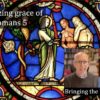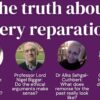Gospel commentary index Lectionary Year A
On this page, you can find an index to all the commentary articles on the gospel lectionary readings for the whole of Year A, together with links to the video discussions between Ian and James. The articles will be reposted with updates during the year—but they are listed here for convenience and planning ahead.
The meeting of Jesus and Nicodemus in John 3
The Sunday lectionary gospel reading for Lent 2 in Year A is Nicodemus’ meeting with Jesus in John 3.1–17. The epistle is Romans 4.1-5 and 13-17. The video discussion of the epistle is here, and of the gospel reading from John 3 here. Both are also linked at the end.
Although we are supposed to be reading from Matthew’s gospel, and the RCL used ecumenically has continued to do so, the lectionary in Common Worship offers us a sequence of four encounters between Jesus and individuals from the Fourth Gospel:
Lent 2: Jesus and Nicodemus (John 3.1–17)
Lent 3: The woman of Samaria (John 4.5–42)
Lent 4: The man born blind (John 9.1-41)
Lent 5: The raising of Lazarus (John 11.1-45)
I understand that this sequence of passages offered the pattern of study in the early catechumenate, providing a framework for discipleship for those preparing to be baptised at Easter. Those composing the CW lectionary decided that we should follow this pattern and depart from the ecumenical lectionary—though I think without any explanation.
These four encounters do not particularly stand out as a sequence in the Fourth Gospel (for instance, in connection with the seven signs or the ‘I am’ sayings) but they are highly characteristic of the gospel’s narrative style. Whilst the gospel contains more detail of the names of both places and people than the Synoptics, it also features these close-up one-on-one encounters between Jesus and individuals, in which all the details of place and other people fade into the background, as if we are in a cinematic close-up. Some of these one-on-one encounters are also connected with each other; thus Mark Stibbe (in his 1993 Sheffield ‘Readings’ commentary, p 62) notes the prominent contrast between Jesus’ encounters with Nicodemus and the woman, in chapters 3 and 4:
Abraham as the father of Jews and Gentiles in Romans 4 video discussion
The lectionary for Lent 2 in Year A is Romans 4.1-5, 13-17. The structure of Paul’s argument here is complex, but the main idea is simple: Abraham is father of…
Taking General Synod with a pinch of salt
Last summer, with a little help, I reimagined how Synod would look to Anthony Trollope and Raymond Chandler, whom I had been reading at the time. Now that the dust…
God’s people, Mary, and the woman of Revelation 12
Last Sunday, I was invited to preach at Oriel College, Oxford, by the Chaplain, Dr Robert Wainwright. All services in the chapel follow the Book of Common Prayer. This year…
What does fasting mean?
Today is the start of the liturgical season of Lent, and it has traditionally been a period of particular spiritual discipline for Christians. Though the Didache (from the end of…
The wilderness temptations according to Matthew 4
As we enter the season of Lent on Sunday, the lectionary for the First Sunday in Lent in Year A is of course Matt 4.1–11. The epistle for this Sunday…
God’s amazing grace in Romans 5 video discussion
The epistle for Lent 1 in Year A is Romans 5.12–19. Paul draws a series of striking contrasts between what it means to be ‘in Adam’, as fallen humanity under…
The discussion at the end of the LLF process
Yesterday in Synod, we spent five hours (yes, five!) on what is likely to be the final debate on the Living in Love and Faith process (LLF), the Church of…
The problems with Project Spire: presentations
Is the Church Commissioners’ proposal for a ‘reparations’ fund (Project Spire) for ‘Justice, Healing, and Repair’ based on historical facts? Will it ‘repair’, or in fact divide us further? Is…
The problems with the C of E’s ‘reparations’ project (‘Spire’)
The Church Commissioners’ response to what has allegedly been learnt about the involvement of its predecessor, the Queen Anne’s Bounty (QAB), in the slave trade was first called Project Spire,…
What is ‘transfigured’ in Matthew 17?
The lectionary gospel reading for the last Sunday before Lent in Year A, is Matt 17.1–9, Matthew’s account of the Transfiguration. You can find video discussion of this commentary here…





































